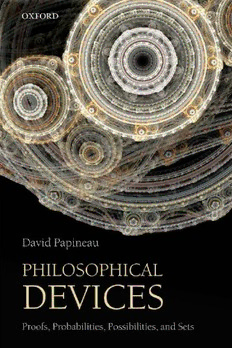
Philosophical devices: proofs, probabilities, possibilities, and sets PDF
Preview Philosophical devices: proofs, probabilities, possibilities, and sets
Philosophical Devices This page intentionally left blank Philosophical Devices: Proofs, Probabilities, Possibilities, and Sets David Papineau 1 3 Great Clarendon Street, Oxford, ox2 6dp, United Kingdom Oxford University Press is a department of the University of Oxford. It furthers the University’s objective of excellence in research, scholarship, and education by publishing worldwide. Oxford is a registered trade mark of Oxford University Press in the UK and in certain other countries © David Papineau 2012 The moral rights of the author have been asserted First Edition published in 2012 Impression: 1 All rights reserved. No part of this publication may be reproduced, stored in a retrieval system, or transmitted, in any form or by any means, without the prior permission in writing of Oxford University Press, or as expressly permitted by law, by licence or under terms agreed with the appropriate reprographics rights organization. Enquiries concerning reproduction outside the scope of the above should be sent to the Rights Department, Oxford University Press, at the address above You must not circulate this work in any other form and you must impose this same condition on any acquirer British Library Cataloguing in Publication Data Data available Library of Congress Cataloging in Publication Data Data available ISBN 978–0–19–965172–6 (Hbk.) 978–0–19–965173–3 (Pbk.) Printed in Great Britain by MPG Books Group, Bodmin King’s Lynn Links to third party websites are provided by Oxford in good faith and for information only. Oxford disclaims any responsibility for the materials contained in any third party website referenced in this work. For my family This page intentionally left blank CONTENTS List of Boxes x iii Preface x v Introduction xvii Part I SETS AND NUMBERS 1 Naive Sets and Russell’s Paradox 3 1.1 Sets 3 1.2 Membership and the Axiom of Extensionality 4 1 .3 U nions, Intersections, and the Empty Set 5 1.4 Subsets 6 1.5 Members versus Subsets 6 1.6 Power Sets 8 1.7 The Axiom of Comprehension 9 1.8 Russell’s Set 10 1.9 Russell’s Paradox 11 1.10 Barbers and Sets 12 1.11 Alternatives to Naive Set Theory 13 Further Reading 15 Exercises 15 2 Infi niteSets 17 2.1 Some Infi nite Sets 17 2.2 Different Kinds of Numbers 18 CONTENTS vii 2.3 Two Senses of ‘More’ 20 2.4 Denumerability 22 2.5 More Denumerable Sets 24 2.6 The Non-Denumerability of the Real Numbers 25 2.7 The Abundance of the Real Numbers 27 Further Reading 28 Exercises 28 3 Orders of Infi nity 30 3.1 Some Harder Stuff 30 3.2 T he Numerical Size of Sets 30 3.3 The Reals and the Power Set of the Natural Numbers 32 3.4 T he Continuum Hypothesis 35 3.5 An Infi nity of Infi nities 36 3.6 T he Generalized Continuum Hypothesis 38 Further Reading 40 Exercises 40 Part II ANALYTICITY, A PRIORICITY, AND NECESSITY 4 Kinds of Truths 45 4.1 Three Distinctions among Truths 45 4.2 Analytic and Synthetic 45 4.3 A Priori and A Posteriori 46 4.4 Synthetic A Prioris 47 4.5 How is Synthetic A Priori Knowledge Possible? 4 9 4.6 Pure and Applied Geometry 50 Further Reading 56 Exercises 56 5 Possible Worlds 58 5.1 Necessity and Contingency 58 5.2 A Posteriori Necessities 59 viii CONTENTS 5.3 A Priori Contingencies 60 5.4 Possibility and Necessity 61 5.5 Possible Worlds 62 5.6 Necessity and Possibility in terms of Worlds 63 5.7 Constraints on Possible Worlds 64 5.8 Essential Properties 66 5.9 The Nature of Necessity 67 5.10 Different Kinds of Possibility 68 Further Reading 70 Exercises 70 6 Naming and Necessity 72 6.1 Two Readings of Statements of Necessity 72 6.2 Scope Distinctions 73 6.3 Julius and the Inventor of the Zip 74 6.4 Rigid Designators 75 6.5 The Causal Theory of Reference 7 6 6.6 Rigidity and the Causal Theory 7 7 6.7 De Dicto and De Re 78 6.8 Necessary and A Priori Again 80 6.9 A Limit to Scepticism about A Posteriori Necessity 81 Further Reading 85 Exercises 85 Part III THE NATURE AND USES OF PROBABILITY 7 Kinds of Probability 89 7.1 Probabilities of Propositions 89 7.2 Kolmogorov’s Axioms 89 7.3 Some Consequences 9 0 7.4 Joint Probabilities 91 7.5 Subjective and Objective Probabilities 94 CONTENTS ix
